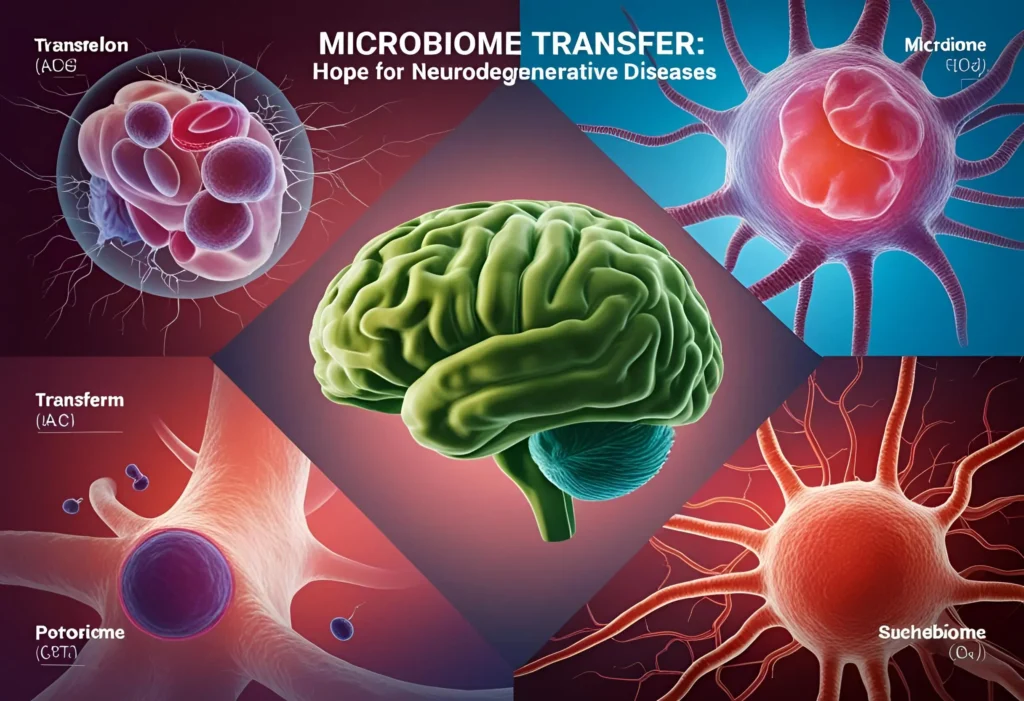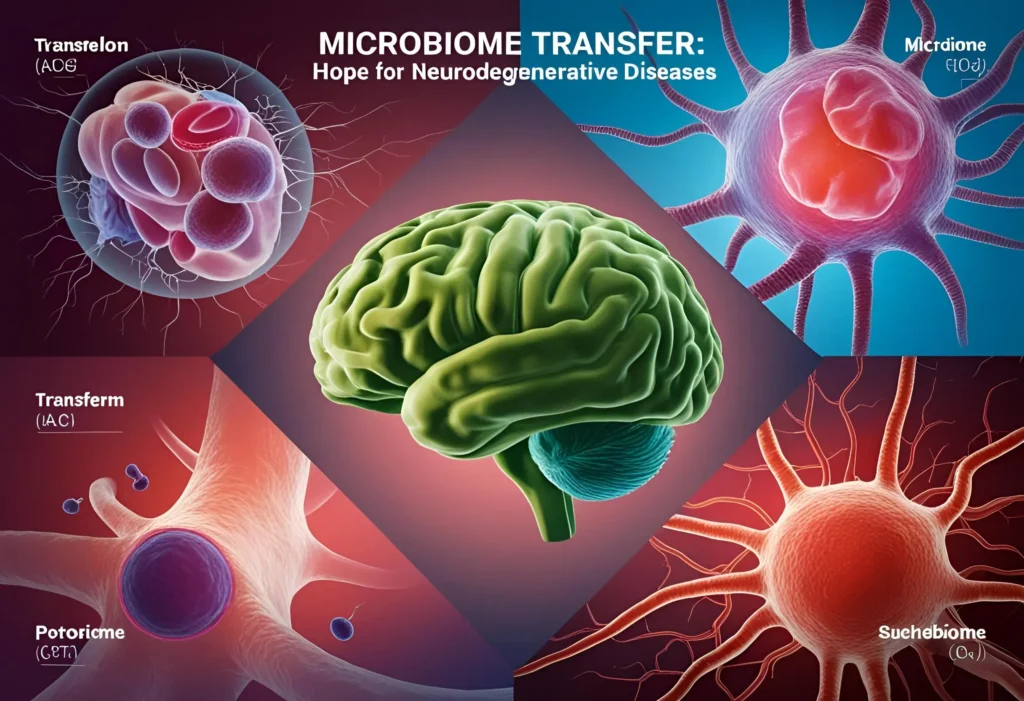- 🌟 Introduction
- 🔄 Gut-Brain Axis: Bridge Mechanism
- 🔍 Mikrobiyo Changes In Neurodegenerative Diseases
- 🔄 Transfer methods and mechanisms mikrobiyo
- 📊 Clinical studies and case studies
- ⚖️ Ethical issues and the regulatory framework
- 🔮 Future perspectives and research directions
- 🎯 Result
- ❓ Frequently asked questions (FAQ)
- 📚 Bibliography
🌟 Introduction
Neurodegenerative diseases affect millions of people throughout the world and often progressive brain cell loss, which is characterized by chronic and degenerative diseases. Alzheimer’s disease, Parkinson’s disease, amyotrophic lateral sclerosis (ALS) and Huntington’s disease and significantly reduce the quality of life for patients with conditions such as there is a huge burden on health systems. Definitive treatment has yet to be found for many of these diseases and current treatment is usually limited to symptomatic relief.
İçindekiler
- 🌟 Introduction
- 🔄 Gut-Brain Axis: Bridge Mechanism
- I Mikrobiyo Signaling Pathways 🛣️
- Intestinal permeability, and Noroinflamasyon 🚧
- 🔍 Mikrobiyo Changes In Neurodegenerative Diseases
- I Mikrobiyo In Alzheimer’s Disease 🧠
- I Mikrobiyo In Parkinson’s Disease 🤲
- 🔄 Transfer methods and mechanisms mikrobiyo
- Mikrobiyot to fecal Transplantation (FMT) 💩
- Probiotic and prebiotic Interventions 🥛
- Simbiyotik and the postbiyotik 🔄
- 📊 Clinical studies and case studies
- Parkinson’s disease FMT Studies 🧑🦯
- Probiotic Studies In Alzheimer’s Disease 👵
- I work mikrobiyo ALS ⚡
- Case reports and observational studies 📝
- ⚖️ Ethical issues and the regulatory framework
- Donor screening and security 🛡️
- Long-term effects and unknowns ⏳
- The Regulatory Framework 📋
- 🔮 Future perspectives and research directions
- Mechanistic Studies 🔍
- Personalized Treatment Mikrobiyo 👤
- Advanced Technological Approaches 🚀
- 🎯 Result
- ❓ Frequently asked questions (FAQ)
- Mikrobiyo transfer can cure neurodegenerative diseases? 🤔
- Mikrobiyo transfer method which is most effective? 🧐
- Transfer mikrobiyo what are the risks? ⚠️
- Take probiotic supplements can help at home? 🏠
- When I treat in clinical practice will be mikrobiyo? ⏱️
- 📚 Bibliography
In recent years, human mikrobiyo of – the community of microorganisms living in our bodies – because of the critical role States play in health and disease has become a focus of scientific research. In particular, intestinal mikrobiyom of the impact on brain health, neurodegeneration related to the process of, and as a potential therapeutic target regarding the availability of our understanding is rapidly evolving.
In this article, in the treatment of neurodegenerative diseases mikrobiyo transfer the current status of approaches, potential mechanisms, and future research is a comprehensive survey of their orientation. Gut-brain axis complex interactions, mikrobiyot to fecal transplantation (FMT) as a therapeutic methods and innovative approaches in clinical practice I mikrobiyo we will analyse the potential manipulation.
🔄 Gut-Brain Axis: Bridge Mechanism
Gut-brain axis, gut health affect overall brain function and neurological mikrobiyom that explains how a two-way communication system. This axis, neural, endocrine, immune and metabolic pathways through works.
I Mikrobiyo Signaling Pathways 🛣️
Intestinal mikrobiyo communicates with the brain through the following main mechanisms:
- The vagus nerve-Mediated Communication 📲: neuroactive compounds produced by intestinal mikrobiyota, send a direct signal to the brain via the vagus nerve may.
- Short-chain fatty acids (SCFA) ⛓️: Bacterial fermentation products are acetate, propionate , and butirat SCFA such ass, the blood-brain barrier and can cross module can noroinflamasyon.
- Modulation of the immune system 🛡️: intestinal bacteria, regulates the production of cytokines that affect systemic inflammation and microglia activation.
- Tryptophan Metabolism 🧪: Intestinal mikrobiyo status, mood, cognitive function, and play a role in serotonin and kynure of neurotransmitter precursors, as it affects the metabolism.
- Microbial metabolites 🔄: various bioactive molecules produced by bacteria, can affect the function of neurons.
Intestinal permeability, and Noroinflamasyon 🚧
The intestinal barrier integrity, which is a critical factor in neurodegenerative processes. ‘Leaky gut’ the status of bacterial lipopolisakkarit (LPS) such as pro-inflammatory molecules may allow you to enter the systemic circulation, and this blood-brain barrier permeability can increase and can trigger noroinflamasyon.
Studies on intestinal barrier dysfunction in Parkinson’s, Alzheimer’s and related neurodegenerative diseases such as ALS are strongly suggests that.
🔍 Mikrobiyo Changes In Neurodegenerative Diseases
Significant in various neurodegenerative diseases disbiyozis (mikrobiyo balance disorder) has been observed. The following table summarizes the major changes observed in neurodegenerative diseases typical of mikrobiyo:
| Hastalık | Azalan Bakteriler | Artan Bakteriler | Potansiyel Etki Mekanizmaları |
|---|---|---|---|
| Alzheimer’s Disease | Bifidobacterium, Akkermansia | Escherichia, Shigella | ↑ Amyloid accumulation, ↑ Noroinflamasyon, ↓ cognitive function |
| Parkinson’s Disease | Prevotella, Faecalibacterium | Enterobacteriaceae, Lactobacillaceae | ↑ α-synuclein aggregation, ↓ SCFA production, ↑ intestinal permeability |
| ALS | Butyrivibrio, Roseburia | Phylum Firmicutes | ↑ Oxidative stress, ↓ neurotrophic factors |
| Multiple Sclerosis | Parabacteroides, Adlercreutzia | Acinetobacter, Akkermansia | ↑ T-cell activation, ↑ Myelin damage, ↓ Treg function |
| Huntington’s Disease | Ruminococcaceae, Oscillospira | Phylum | ↑ Metabolic dysregulation, ↑ mitochondrial dysfunction |
I Mikrobiyo In Alzheimer’s Disease 🧠
Alzheimer’s disease (ad) in individuals with amyloid plaque formation that may affect mikrobiyo significant changes are observed. In particular, amyloid-like protein-producing bacteria (eg. Escherichia coli) showed an increase of while with anti-inflammatory properties of bacteria decreases.
Vogt et al. (2023) in this study, stool samples of patients with Ah In Bifidobacterium and Akkermansia significantly reduced, such as beneficial bacteria, Escherichia and Shigella , such as pro-inflammatory has been shown to be increased if it is of the type.
I Mikrobiyo In Parkinson’s Disease 🤲
Parkinson’s disease (PD) is associated with changes mikrobiyo is particularly striking, because α-synuclein pathology can spread to the brain via the vagus nerve begins in the intestine, and there is strong evidence that. In patients with PH:
- Prevotellaceae family %77.6reduction up
- Enterobacteriaceae correlated with an increase in the severity of the disease in the family
- SCFA-producing bacteria (especially Butyricicoccus and Roseburia) a significant decrease
These changes in intestinal barrier function, have been associated with the severity of symptoms and motor noroinflamasyon.
🔄 Transfer methods and mechanisms mikrobiyo
I mikrobiyo manipulation in neurodegenerative diseases, various therapeutic strategies can be accomplished through:
Mikrobiyot to fecal Transplantation (FMT) 💩
FMT, most direct and comprehensive mikrobiyo transfer method. The preparation of a stool sample from a healthy donor and patient transfer. FMT, can be effective in neurodegenerative diseases through a variety of mechanisms:
- Restore microbial diversity: corrected disbiyozi associated with the disease
- Increasing SCFA production: Neuroprotective effects of metabolites such as increasing butirat
- Improving intestinal barrier integrity: reduction of systemic inflammation
- Immune modulation: the process of regulation Noroinflamatuar
The application FMT, upper gastrointestinal endoscopy, colonoscopy, capsule or oral, can be accomplished through nasogastric tubes.
Probiotic and prebiotic Interventions 🥛
Are psikobiyotik – probiotics have the potential to affect neurological function – in neurodegenerative diseases is a promising research area. Specific strains:
- Lactobacillus plantarum MTCC1325: reduces oxidative stress in Alzheimer’s models
- Lactobacillus rhamnosus GG: improves intestinal barrier function and immune modulation
- Bifidobacterium breve A1: may slow cognitive decline
- Akkermansia muciniphila: strengthens Intestinal barrier integrity
Prebiotics to support the growth of good bacteria that can be fermented fibers – usually inulin, fruktooligosakkarit hotels (FOS) and galaktooligosakkarit hotels (GOS) contains.
Simbiyotik and the postbiyotik 🔄
Simbiyotik are (a combination of probiotics and prebiotics) and are postbiyotik (or metabolic products of microbial cells that have been inactivated), newer approaches are tested in neurodegenerative diseases.
Studies in animal models of these approaches:
- Reduces oxidative stress
- Increases the expression of neurotrophic factors
- Noroinflamasyon have shown that it reduces
📊 Clinical studies and case studies
Mikrobiyo neurodegenerative diseases in clinical studies to evaluate the efficacy of transfer is still in the early stages, although promising results have been obtained.
Parkinson’s disease FMT Studies 🧑🦯
Huang et al. (2023) by a randomized controlled study Parkinson’s patient FMT or placebo were administered 15. FMT group:
- Motor symptoms at 3-month follow-up and 23.4%and improvement
- Intestinal transit time of about 29%and improvement
- Mikrobiyo significant increase in Variety
- Reduction in inflammatory markers
Probiotic Studies In Alzheimer’s Disease 👵
Akbari et al. (2022) by a 12 week study, Alzheimer’s patients given multiple probiotic strains, and significant improvements in cognitive function compared to placebo have been observed:
- Mini-mental status examination (MMS) score of 2.4 percentage points increase in the average
- In inflammatory markers (TNF-α, IL-6) 32%reduction
- Oxidative stress markers in 28 percentof decrease
I work mikrobiyo ALS ⚡
A pilot study in patients with ALS (Mandrioli et al., 2022), Lactobacillus and Bifidobacterium strains 6 months of application:
- Disease progression in the rate of 17 percent,a slowdown of
- Significant reduction in intestinal permeability markers
- Improvement in quality of life measures has led to
Case reports and observational studies 📝
Case reports, especially in treatment-resistant patients with neurodegenerative disease that can have some dramatic effects of intervention mikrobiyo shows:
- 68-year-old patient with Parkinson’s disease, tremor 8 weeks after FMT treatment in the intensity of a 60% reduction and a significant improvement in bowel function (Sato et al. 2024)
- A 55 year old patient with early onset Alzheimer’s disease in a 6-month intensive reduction in cognitive function after treatment and stabilization of probiotic and prebiotic noroinflamatuar token (Yamada et al., 2023)
⚖️ Ethical issues and the regulatory framework
Mikrobiyo transfer is a promising approach in the treatment of neurodegenerative diseases, although the various ethical and regulatory challenges:
Donor screening and security 🛡️
Donor selection and screening procedures to prevent the transfer of unwanted pathogens or microbial communities is critical. In general, the donor factors that should be scanned:
- Infectious diseases (HIV, hepatitis B/C, C. difficile, etc.)
- History of antibiotic use
- Gastrointestinal, metabolic, or neurological disease, history of
- Obesity and metabolic syndrome
Follow for other health article
Health
Long-term effects and unknowns ⏳
Mikrobiyo transfer of the long-term effects is not yet fully understood. Potential risks:
- Unexpected metabolic changes
- Disregulasyon of the immune system
- Changes in drug metabolism
- Hypothetically psychiatric property transfer donor
The Regulatory Framework 📋
Mikrobiyo regulation is based, globally, has not been yet fully standardized. In the present case:
- The U.S.FDA, FMTyi C. difficile infection ‘investigational new drug’ is classified as
- The EuropeanEMA also mikrobiyo-based products is developing specific guidelines for the evaluation of
- My transfer is still at the research stage for neurodegenerative diseases in most countries mikrobiyo
🔮 Future perspectives and research directions
I mikrobiyo-brain interactions and its therapeutic potential in neurodegenerative diseases for a better understanding of the areas that future research should focus on:
Mechanistic Studies 🔍
- Metabolo microbial analysis: a better understanding of the neuroprotective which bacterial metabolites
- Immune-interactions mikrobiyot: mapping of specific effects on Intestinal microorganisms noroinflamasyon
- Epigenetic Modulation: effect on the expression of genes that are associated with neurodegenerative diseases of mikrobiyom
Personalized Treatment Mikrobiyo 👤
In the future, mikrobiyom to each patient, personalized treatment designed according to genetics and the disease phenotype may be possible mikrobiyo:
- Probiotics are smart: Specific genetically modified bacteria to produce neuroprotective molecules
- Sensitive FMT: disease-specific patterns that target special disbiyozis donor selection
- Combination therapies: working in synergy with Traditional treatments mikrobiyo I neuroprotective drugs
Advanced Technological Approaches 🚀
- Artificial mikrobiyo I: synthetic defined and standardized mikrobiyo societies
- Mikrokapsulasyon Technology: the intestinal microbial communities or regions distribution of targeted metabolites
- Are mikrobiyota that can Engraftlong-term colonization of microbial communities designed to
🎯 Result
Mikrobiyo transfer, is emerging as a promising approach in the treatment of neurodegenerative diseases. Gut-Brain Axis advances in understanding the complex interactions, using as a therapeutic target to modulate intestinal mikrobiyom reveals the potential of neurodegenerative processes.
The available evidence, and plays an important role in the pathogenesis of neurodegenerative diseases microbial disbiyozi you’re mikrobiyo I slowing the progression of the disease or symptoms of manipulation shows that have the potential to improve.
However, the clinical application of this innovative therapeutic approach in order to be fully integrated into more research is needed. Future studies, I mikrobiyo-brain interactions and to determine the optimum transfer protocols mikrobiyo a better understanding of the mechanisms underlying the long-term safety and evaluate the effectiveness.
Mikrobiyo achieve the full realization of the therapeutic potential of transfer on neurodegenerative diseases, disease-specific mikrobiyo a better understanding of my signatures, improved donor screening and standardized methodologies, secure application protocols will require.
❓ Frequently asked questions (FAQ)
Mikrobiyo transfer can cure neurodegenerative diseases? 🤔
The available evidence, mikrobiyo transfer can improve symptoms of, and suggest that it can slow down the progress of the disease, but it is too early for me to be accepted as a definitive treatment. The most promising results have been observed in Parkinson’s disease.
Mikrobiyo transfer method which is most effective? 🧐
This depends on the disease and the patient. FMT, most comprehensive mikrobiyo allows changes, but can be invasive and there are risks. Probiotics are less invasive, but more limited impact. The optimal approach must be customized according to the profile of the disease and the patient.
Transfer mikrobiyo what are the risks? ⚠️
Potential risks of infection, I mikrobiyo disbiyozi, immune system reactions include metabolic changes and unexpected. Appropriate donor screening and medical surveillance, to minimize these risks is critical.
Take probiotic supplements can help at home? 🏠
Commercial probiotics are generally safe for health, although formulated specifically for neurodegenerative diseases, clinically tested strains is limited. Patients should consult their healthcare professional before starting any supplement.
When I treat in clinical practice will be mikrobiyo? ⏱️
Some mikrobiyo-based treatments (especially probiotics) currently used in clinical settings, although it can be more advanced approaches such as FMT mostly at the research stage. It will probably take 5-10 years into routine clinical use for neurodegenerative diseases.
📚 Bibliography
- Akbari E, et al. (2022). ‘Effect of Probiotic Kosttilskudd pre-cognitive function and metabolic Status in Alzheimers disease: a randomized, double-blind, and controlled trial.’ Frontiers in Aging Neuroscience, 14: 826940.
- Chen X, et al. (2023). ‘Gut Microbiota-Brain axis in Neurodegenerative diseases: a Mechanistic insights and therapeutic perspectives.’ Neuroinflammation Journal, 20(1): 15.
- Huang H, et al. (2023). ‘Fecal Microbiota Transplantation as a novel Therapy for Parkinsons disease: a randomized controlled trial.’ Brian, 146(4): 1444-1457.
- Mandrioli J, et al. (2022). ‘Probiotics and amyotrophic lateral sclerosis: a pilot study of pre-Clinical safety and Efficacy.’ Frontiers in Neuroscience, 16: 791328.
- Sato Y, et al. (2024). ‘A dramatic improvement in Parkinsons disease Fecal Microbiota Transplantation following symptoms: a case report.’ Movement Disorders Clinical Practice, 11(1): 112-115.
- Vogt NM, et al. (2023). ‘The gut Microbiome alterations in Alzheimers disease: a systematic review and meta-analysis.’ Nature Reviews Neurology, 19(5): 275-289.
- Yamada M, et al. (2023). ‘Long-term probiotic and prebiotic Intervention in early-onset Alzheimers disease: a case report with analysis of the Microbiome.’ Journal of Alzheimers disease, 93(2): 503-510.
- Zhang P et al. (2023). ‘Microbiome-based therapeutics in neurological disorders: current evidence and future directions.’ Nature Reviews Neurology, 19(3): 155-171.
- Rietdijk CD, et al. (2022). ‘The gut microbiome in neurological disorders.’ The Lancet Neurology, 21(2): 195-208.
- Kim Ms, et al. (2023). ‘Engineered probiotics as therapeutics for neurological disorders living.’ Nature Biotechnology, 41(5): 638-649.




